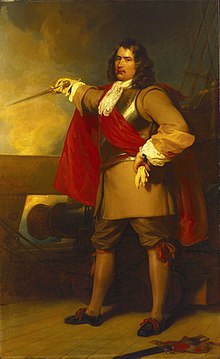
Back روبرت بلايك (أدميرال) Arabic Робърт Блейк Bulgarian Robert Blake Czech Robert Blake Welsh Robert Blake (Admiral) German Robert Blake (almirante) Spanish Robert Blake (amirala) Basque رابرت بلیک Persian Robert Blake (amiral) French רוברט בלייק HE
Robert Blake | |
|---|---|
 Robert Blake, General at Sea, 1598–1657 (by Henry Perronet Briggs, painted 1829) | |
| General at Sea, 1598–1657 Lord Warden of the Cinque Ports, 1656 to 1657 | |
| In office 1656–1657 | |
| Preceded by | Thomas Kelsey |
| Succeeded by | Lord Winchilsea |
| Personal details | |
| Born | 27 September 1598 Bridgwater, England |
| Died | 7 August 1657 (aged 58)[1] Off Plymouth, English Channel |
| Resting place | Westminster Abbey (initially); St Margaret's (now) |
| Relations | Joseph Blake (nephew) |
| Nickname | "Father of the Royal Navy" |
| Military service | |
| Allegiance | |
| Branch/service | |
| Years of service | 1649–1657 |
| Rank | General at sea |
| Commands | Mediterranean Fleet |
| Battles/wars | English Civil War First Anglo-Dutch War Anglo-Spanish War |
Robert Blake (27 September 1598 – 7 August 1657) was an English naval officer who served as general at sea and the Lord Warden of the Cinque Ports from 1656 to 1657. Blake served under Oliver Cromwell during the English Civil War and Anglo-Spanish War, and as the commanding Admiral of the State's Navy during the First Anglo-Dutch War. Blake is recognized as the "chief founder of England's naval supremacy", a dominance subsequently inherited by the British Royal Navy well into the early 20th century.[2][3] Despite this, due to deliberate attempts to expunge the Parliamentarians from historical records following the Stuart Restoration, Blake's achievements tend to remain relatively unrecognized.[1][4] Blake's successes, however, are considered to have "never been excelled, not even by Nelson" according to one biographer,[5] while Blake is often compared with Nelson by others.[6][7][8]
- ^ a b "British Civil Wars, Commonwealth and Protectorate – Robert Blake 1599–1657". British-civil-wars.co.uk. Retrieved 21 October 2017.
- ^ Westminster Abbey
- ^ BCW: Robert Blake, Essay
- ^ Bridgwater Blake Museum, 2016, Essay
- ^ Yexley, 1911, p. 22
- ^ Dixon, 1852, pp. ix, xi
- ^ Hannay, 1886, pp. 1, 73, 188
- ^ Powell, 1972, p. 309